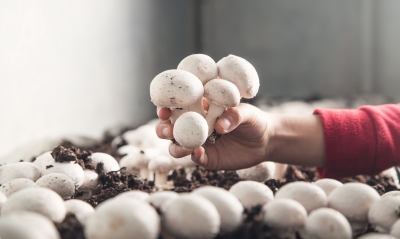Phase 1: Making Fresh Compost
The process of mushroom farming starts with the creation of fresh compost. A balanced mixture of different raw materials, including hay, straw, and poultry manure, is used to create the compost. Proper moisture, temperature, and aeration are key to bringing about the desired chemical reactions within the compost.
Phase 2: Filling the Bunker and Tunnel
Once the compost is created, it is filled into the bunkers or tunnels where they undergo pasteurization and conditioning. The compost temperature is closely monitored in this phase to ensure that it remains within the ideal range between 56 and 60 degrees Celsius.
Phase 3: Mixing Spawn in the Compost
After the pasteurization and conditioning, the compost is ready for the addition of spawn. The spawn is mixed with the compost in one-fourth or one-third ratios to foster the spawn run phase. The spawn run typically takes around 2-3 weeks, where it colonizes the compost with mycelium.
Phase 4: Emptying the Tunnel and Filling the Growing Room
Once the spawn run phase is completed successfully, the next step is to empty the tunnel and transfer the mycelium-colonized compost to the grower room. The compost is evenly distributed and leveled out to prepare for the onset of mushroom growth.
Phase 5: Mushroom Development and Harvesting
During the next phase, the mushroom pins grow, rapidly turning into mature mushrooms. The mushrooms' development requires strict regulation of the temperature, humidity, and air ventilation to create a conducive environment for growth.
Once the mushrooms reach full maturity, they are carefully harvested by hand. The mushroom picking process requires a high degree of precision to ensure that only mature mushrooms are harvested.
Phase 6: Cook-out, Emptying, and Cleaning
After the harvest, an essential step in the mushroom farming process involves emptying the growing room and cleaning the equipment to ensure sanitation and prevent contamination. The mushrooms are then sent out for packaging, shipping, and sale.
In conclusion, mushroom farming is a complex process that requires attention to detail at every step. From fresh compost to harvesting and sanitation, each step plays a crucial role in producing high-quality mushrooms. By following these steps closely, mushroom cultivators can achieve optimal results and contribute to the ever-growing demand for fresh and delicious mushrooms.
Blog by Fred Musc
About the mushroom production process
Feb 26,
2024






















